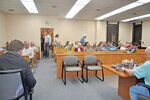Despite clearly voiced opposition to using and renovating the county-owned Orchard Hill complex for relocation of county administrative offices, Washington County Supervisors at the April 11 special …
This item is available in full to subscribers.
We have recently launched a new and improved website. To continue reading, you will need to either log into your subscriber account, or purchase a new subscription.
If you had a login with the previous version of our e-edition, then you already have a login here. You just need to reset your password by clicking here.
If you are a current print subscriber, you can set up a free website account by clicking here.
Otherwise, click here to view your options for subscribing.
Please log in to continue |
|



Despite clearly voiced opposition to using and renovating the county-owned Orchard Hill complex for relocation of county administrative offices, Washington County Supervisors at the April 11 special listening session gave no indication of reconsidering their positions on the move. About 60 county residents were in attendance and all who spoke favored the former Federation Bank building, asking the board to reconsider its plan.
Of the four at the meeting (Richard Young was unable to attend), Chairman Bob Yoder and supervisor Stan Stoops favor the Federation Bank offer that would leave the offices downtown. In February, Yoder was the single vote for the bank site when the board voted to proceed with Orchard Hill. Stoops was unable attend that meeting and while, initially, not certain about the bank site, Tuesday he joined Yoder, noting “This is about what people want. All we’ve got to do is go back to the drawing board and make it work,” adding, “We can make it work.” He stressed that right now the board is at the “grassroots level,” that the board needs “to listen to these people and that we’re not. I am not going to be part of that.”
Earlier in the nearly two-hour session, supervisor Marcus Fedler, a member of the planning committee for the Orchard Hill renovations, provided a detailed explanation about used and unused space at Orchard Hill, how renovations there would consolidate administrative offices space needs from four sites to two, and improve county governing efficiency. He noted that currently the county offices are housed in the courthouse; at the county-owned Orchard Hill; in the McCreedy building (assessor and engineer) near the courthouse; and for about a decade has rented for Public Health the upper three floors of the Federation Bank Building (the bank recently moved). Well prior to the bank move, the county was offered the building for $1.6 million, later cut in half to $800,000.
Referencing space needs, Fedler said that there is 18,000 square feet at Orchard Hill where “about 8,000 of it sits empty all the time.” He added that amount of footage means the county does not have to build any new building. Even more, he stressed that there was “space to grow” at Orchard Hill if and when it proved necessary.
“We already have the space. . . we’re trying to use what we have,” he said. There was agreement from supervisor Jack Seward Jr. who advocated keeping county operations in existing county property “and not take any more county property out of the tax base”.
There was further discussion about input regarding both space needs and relocation from the residents and county department heads, including noting that the latter may fear retaliation for taking issue with superiors and the supervisors.
However, one department head, County Treasurer Jeffrey Garrett, noted he was part of a group of department heads “who have been pretty vocal about our desire to stay in the downtown,” adding that “if it’s not feasible or is voted against,” it would be accepted. “You win some, you lose some.”
He said all department heads want to be part of the solution and that he has no fears about retaliation for the downtown stance. Other than the supervisors, he was the only county elected official among the speakers.
Further comments and questions dealt with a possible economic impact from the move on the city’s downtown, a suggestion that voters should have a say (as in a vote) on how the American Rescue Program Act (ARPA) funds be used (the county received approximately $4.3 million in federal funds) and that the will of the people needs to be considered.
Fedler responded that the supervisors were elected to make right decisions, not necessarily ones the voters want. He stressed that he always wants to do what is right.
There also were concerns voiced about HACAP, which rents facilities in Building 2, a central part of the relocation plan, and some about the feasibility plan done by Carl A. Nelson Associates that had an estimated total project cost of $6 to $7.5 million, covering several options, including a new building for the engineer’s office. However, supervisors Tuesday clarified that the engineer’s office was removed from the plan, adding funds for the courthouse renovations would come from the county and that the engineer’s office relocation would be a separate county project.
Estimates for Orchard Hill and courthouse renovations, discussed earlier by the board, are in the $4.5 to $5 million range; however, a previously approved contract for digitalizing of county records reduced the APRA funds to $3.8 million. As a result, to proceed with spending on Orchard Hill, the county may have to seek a later referendum, which Fedler has said was not in the plan.
The plan calls for, after relocation of administrative offices, having all judicial services housed in the courthouse, including probation services for both adults and juveniles; Outreach, DHS and Department of Corrections offices; as well as the county attorney office, clerk of court and the courtroom that are already there.
Tuesday’s public meeting had been arranged by the Washington Chamber of Commerce whose executive director, Michelle Redlinger, during the session, asked about financial and other details in the Nelson report. She and other speakers referred to the economic impact of keeping the country offices in the downtown of the county seat and the loss in pedestrian traffic from their removal to the west edge of the city.
The relocation plan is the first business item for the April 17 supervisors meeting.